As promised in the previous blog entry, I now find myself caught up with enough of my coursework and lesson planning that I can put a few hours aside to talk about this past weekend’s trip to Wadi Rum, my second one in two weeks. My backbone is slowly shifting into alignment again, and I’m finding less sand in my ears than yesterday. All and all, with the exception of the sore throat, I’m feeling very good!
We left Amman at about 8 in the morning, a caravan of two cars heading south down the Desert Highway. I was with Aaron and his girlfriend Laura, while Jeff and two other friends, Amir and Lillie, came along behind in the second car. We made fairly good time through the light rain in Amman, and the ride was smooth thanks to Laura’s car, a Mitsubishi that to be perfectly honest was the nicest car I’ve been in since arriving in Jordan. The one fault it had, as we three soon found out, that after passing 120 kilometers per hour (around 70 mph) that the car makes an urgent, constant beeping noise. “Warning!” it seems to tell you, helpfully. “This car is traveling quickly! You must be on a highway, where you may hit a goat at any moment! Warning!” Thankfully, the sound of our teeth grinding together drowned out the beeping after half an hour. That – plus the combination of horrible, 1980’s pop-crooner music that the Jordanians must think that Americans love (and rap, of course) and play on the few English stations – was enough to make me happy that I was still so tired from the previous night that I could easily fall asleep in the back seat.
About halfway down the country, a change in velocity (and the sudden lack of beeping) woke me up suddenly and I saw that we were being waved down to the side of the road by a mustachioed, slightly comical-looking police officer (think Mario, with a badge). As cars were clearly still zooming past at almost identical speeds, the guy clearly was noting the nice car and the Americans inside and thinking “easy pickings.” He greeted Aaron in passable English, and after the usual license-and-registration check (some things are always the same in every country, I guess), consulted briefly with a fellow officer and then gazed off into space, stroked his mustache, and said, “you must pay…errrrm….twenty dinars.” Laura muttered, “I’d like to see them give us a ticket.” All three of us clearly suspected that this wasn’t an “official” request for money, but instead a “please bribe me now” request. Aaron spoke loudly in his friendly, I-Am-A-Tourist voice, “No Money! Don’t Have Any! We Are Sorry!” The officers clicked their tongues at us, tsk’ing in reproach, and stepped away to consult again. The tongue-click, or “tsk” is the primary method of showing disapproval here, which took me by surprise because I’ve never seen anyone under 60 do that consistently in the States. Meanwhile, as we watched, the officers tried to flag down another car that was zipping past us. As we watched, the young women inside waved back at them cheerfully, and then sped up again and continued down again. Apparently, that’s what we should have done. Finally, the two officers returned, and Mario poked his head back into the window, returning Aaron’s license-and-registration again and said, “Well, be more careful next time.”
The sun rose into the sky, racing the now-familiar reddish mountain crags for height before dropping off suddenly into sloping dunes and desert for miles in the distance, broken only by chains of massive power pylons like sentinels, shifting and looking almost animated as the heat-haze drifted over the sand. I wondered if the pylons were carrying power from north to south or vice versa, and why so many of them were needed for the tiny concrete villages that seemed to be the only sign of life besides the hiss of the cars on asphalt. At about 11:30, we pulled off the highway into the entrance to the Wadi Rum Protected Area, the same driveway that my tour bus had gone up two weeks before.
We stopped off at Beit Ali, or “Ali’s House,” a small compound at the edge of the reserve that was the last place to get drinks before heading off into the dunes, or rent ATV’s for desert use at exorbitant prices. We tsk’ed in amazement and disbelief at the cost of a can of crappy Amstel beer (4 dinars per can? 20 dinars for a bottle of wine?) but had little choice but to pay the robber’s fee; “like being in New York, without the civilization,” I commented wryly as we climbed back into our cars.
A few more kilometers into the desert along the small and winding, but well-kept road, and we had reached the end of the track for our own vehicles; further travel inwards was restricted to registered guides to prevent damage to the ecosystem and the whole death/dehydration thing that unfortunately comes from being inexperienced and lost in the desert. We didn’t mind; Laura and Lillie, the trip’s masterminds, had already contacted their favorite guide, Suleiman the Bedouin, and he would be meeting up with us shortly. Sure enough, after only a few minutes of casually tossing a football around the parking lot, the man himself rattled up to us in a sage-colored Toyota pickup with an open bed. He hailed us with a gleaming smile, which matched his gleaming white robe, as he stepped from the truck to help us lift our bags into the bed. He greeted everyone warmly; apparently this group had been using his camp for quite awhile now. I was struck by his height, smooth English, and especially by his very Westernized sense of humor – which made sense, since his job was to be a companion to mostly-Western tourists!
After we had piled the truck full with our coolers, packs, and selves, the engine grumbled to life, and we lurched out into the Bedouin village, passing by goats, camels, and cavorting children who flashed by us in bouncing blur as we left the low buildings behind and entered the actual desert. I saw a vague blur of a ubiquitous Orange Telecom building (even HERE?), and had enough time to shake my fist and tsk a couple times before it too vanished in a cloud of dust behind us.
All of us except poor Jeff had sunglasses on, which we quickly adjusted tightly across our face because the combination of sun, sand, windblasts, and insane bouncing did not let up for the next 15 minutes of roaring across the dunes. Suleiman was definitely getting a kick from treating his truck like a four-wheeler ATV. As our hair whipped around our faces and we struggled to hold onto our pots, pans, and coolers, the mountains got increasingly larger and even more impressive. I tried to photograph, video, and hold onto things at the same time, but I don’t believe I was too successful and therefore that particular photography won’t grace the website. Laura mentioned that when they needed to travel at night, the Bedouins guided themselves with the lights of their trucks turned off, using the ridges and spires of the mountains as navigational tools. Looking around me at the distinctive crests that surrounded us, I understood that to a Bedouin, born and raised in the desert, they would be as clear as painted signposts.
Just as it seemed that our teeth would rattle themselves out of their jawbones, we jolted to a halt and found ourselves at Suleiman’s camp, where we met fellow camp manager Ali, a slender, quiet young man who wore contemporary jeans and t-shirt instead of robes. While modest in comparison to the ritzy “Magic Oriental Camp” from my last trip out to Rum, I preferred this camp immediately for its small, cozy size and its greatly improved view out over the mountains. Less touristy; more authentic. Although this one was small, it still had a tiny but serviceable kitchen, and flush toilets and a shower hooked up to tanks suspended in the rocks of the mountain it snuggled up against. I asked Suleiman about that other camp, and he informed me that it was actually not even Rum itself, but instead considered part of a village called Disi, way back at the edge by the highway. The way he said it made me believe that perhaps the Bedouins of the “deeper desert” felt a little superior to the ones on the fringes.
We didn’t time before getting started with the main event of the evening – the cooking! My chosen dish was my dear Aunt Jennifer’s “Rocky Mountain Mashed Potatoes,” which is so-titled because, as she says, “they look formidable from a distance.” I had picked up 8 huge potatoes that morning before we left Amman, and it took about 20 minutes to get them chopped up into small chunks to have them soak over the gas flames of the small stone lodge next to the fire. Suleiman inspected my handiwork closely, and I jokingly shooed him away, saying “Ma fee mushkelay hohn, anna ma’lim!” – “There’s no problem here, I’m an expert!” He was amused with my Arabic attempts, and for the rest of the weekend only referred to me as “Al-Ma’lim.”
As Aaron and I worked over our vegetables (he with green beans and carrots), Lillie busied herself with preparing the turkey, which was destined to be cooked in a method never-before seen by the West – the Bedouin zarb oven! We all watched with interest as Lillie withdrew the dripping turkey (which is called deak in Arabic) from its brine and Suleiman tucked it gently into cylindrical metal stand, which he then lowered into an old, slightly-smoking oil drum which no one had noticed before because it was buried underground except for the top two inches of it. The stand fit into it perfectly, and there the turkey sat, peacefully awaiting its smoky tan. The two Bedouins covered the top of the drum with metal cover, sealing it perfectly and then used shovels to bury the entire setup under a foot of sand. A few puffs of smoke weakly floated from the reddish mound, and then nothing. Suleiman brushed the sand off his hands briskly and flashed his grin at us again. “Give it a few hours and it will be ready to eat,” he promised.
With my potatoes simmering on the stove, the deak in the zarb, and some time to kill, four of us decided to experience Wadi Rum in the traditional way: have a Bedouin drive you out in the desert and then take pictures of you doing random things! I had thought that Aaron had been out to the desert as many times as Laura, so I was surprised when he confessed that he had never actually been into the protected zone. He and I, as well as Erica and Lauren, found that without luggage and coolers to wedge us in place, we bounced even more around the bed than we had on the way into the desert; the threadbare pad over the metal bench was not nearly enough and my tailbone my never be the same. Suleiman mysteriously told us that we would be “Sand Dune Jumping” and we soon found out what he meant. The truck halted in front of a huge vista of flat desert at the bottom of a rise of dune, but the purpose was not for sightseeing; Suleiman directed us over to a small patch of undisturbed dune, about 30 feet of slope, entirely and deeply covered with thick, rust-colored sand. Staggering slightly as our feet tried to gain purchase, we followed him.
Suleiman demonstrated exactly what he meant with his statement, hitching up his robe around his waist (he was wearing pants after all) and taking a running leap down the hill. “I will take your photos, and you will take long jumps down the hill while I catch you in mid-air. It is a beautiful sight, and a very soft landing, too!” The four of us warmed up to this idea in varying degrees; Aaron was somewhat skeptical of the idea, but I quickly proclaimed that long-jump style leaps were not nearly enough for such an expanse of sand, and instead, Superman would need to be emulated. The other four exchanged glances, and Aaron said something to the effect of, “yeah, you first, man.” Obviously, me going first was exactly what I had intended, and after removing my electronics from my pockets, I demonstrated why my nickname in high school was “The Man Of Steel.”
(“Anta Tumza!” means “you’re kidding!”)
…okay, when I said “Steel” I perhaps may have been exaggerating. I wish that Suleiman had been able to catch me in the frame a little bit better, because trust me when I say that there’s nothing more exhilarating than leaping about 5 feet out in the air, feeling the breeze in your hair and the sun on your face, and then landing semi-hard on your wrists and feeling the sand in your hair and the sand on your face…and in your pockets…and in your ears…and nostrils. They may not teach this in schools, but the desert? It’s filled with sand. A lot of it. I pulled out my pockets and dropped about half a pound in a second, and spat some of it out. Suleiman called over to me, “They may not have told you about the new rule that we’ve made about desert conservation, but before you leave you’ll have to strip naked and be shaken down to make sure you’re not sneaking any of our sand.” I noticed that everyone was chuckling at me from up at the top of the hill, but I couldn’t quite make out what was being said through dense sand packs in my ear canals. I ended up taking my somewhat-Supermanish flights four more times before deciding that I should call it quits before taking the entire dune home in my pockets.
The second stop in the mini-tour was the Bridge, which was simply a huge natural sandstone formation, weathered out to form an easily-accessible bridge that attracted about two dozen other guided tourists. The rocks were covered in puffing middle-aged Americans who were being gently guided by white-robed Bedouins higher up into the rocks so that they could have their photo op atop the majestic stone. Having discarded my shoes during the dune leaping session, I scampered easily up the rocks after leaving my camera with Suleiman (I do have a love of climbing random things) and we all posed on the huge shelf, standing on a platform that was edged with countless initials and dates of past visitors over the years. I wondered if that was a good idea; this was all sandstone and therefore much more likely to break apart compared with other subjects of graffiti.
After making one last brief stop in the bottom of a canyon buried between two massive cliffs that had some 7000 year old carvings and pictoglyphs in it, we began the bouncy journey back to the camp to rejoin our fellows. We made a slight detour on the way when Suleiman noticed that another Bedouin’s truck had broken down far out in the desert; he gave the guy a lift to another camp that actually looked like a real non-tourist area; they had a flock of sheep and a camel lazily snacking on the patches of shrubs that grew everywhere. Still in my bare feet, I declined to stretch my legs momentarily when I noticed the sand was completely covered in dung from the animals. When we started off again along the deep ruts in the sand that was the only visible path back towards the others, I found myself fantasizing that the deep gouges and creases in the sheer rock faces of the mountains were like the air bubbles in a slice of bread, and that the play of dark shadows on the red and black stone were chocolate and strawberry syrup being poured over a shortcake desert.
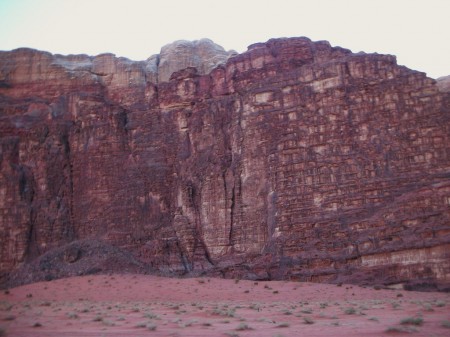
I mean, don't they look like cake with syrup poured over them? Maybe it was just that my mouth was already filled with sand that I was having these thoughts.
I managed to keep myself from drooling too much over the next hour back at the camp as we reunited and continued the dinner preparations. The potatoes were perfectly mashed and the sour cream and cream cheese were added, but I realized I had forgotten to boil the yams, thus damaging my Aunt’s perfect recipe and making more plain mashed potatoes. There were sweet potatoes, candied carrots, beans with bacon (which Ali and Suleiman carefully avoided coming near) and pecan, apple, and spice pies for dessert. The crowning jewel of the preparations of course was the removal of the deak from its underground tomb, which caused a belch of collected smoke and a pungent aroma to rise from the uncovered drum. The Bedouins pulled the bird from the zarb and we saw what a smoked turkey really looks like – dark meat. A couple of us joked about needing more meat in our diets, and Suleiman sized me up and said to Lillie, “You could put the ma’lim in now; he should only take a couple of hours to cook.” Meanwhile, the low table was set in one of the tents and everyone gathered around it, cross-legged, to begin the feast!
The food was bountiful and delicious, and the company was excellent. The turkey itself, as I’m sure you’re curious, had a salty, smokey flavor which was unusual, but wonderful (although, as Jeff quickly discovered, the skin was completely inedible from the amount of smoke that it had absorbed). Lillie’s brining job was perfect and even though it had sat in a dry fire for two and a half hour, the meat just fell from the bones. I highly recommend building your own zarb and metal stand and giving it a try. You may also have to build your own desert as well for the full effect, but Thanksgiving is a good time to be resourceful! We crouched over our low tables in the smokey-smelling tent for a good hour tucking away before finally falling away, spent, as our ability to sit cross-legged was overwhelmed by our added mass.
The stars were the only things visible outside in night sky; having been to Rum exactly two weeks ago with the full moon, this time we were going to experience the exact opposite. We pulled the thin all-purpose farshat (mattresses) around the flickering campfire and everyone looked about ready to nod off, thanks to the tryptophan in our systems. I couldn’t believe it was only 8 in the evening. Suleiman seemed to know the best way to keep us awake – within another few minutes he had arranged for his cousin Hamid to show up with some British tourists, and Hamid played the uud (a small guitar-like instrument that sounds a little like a ukulele) for us and sang songs about lost love in high pitched, ululating tones. The ethereal voice and uud, combined with the flickering faces around the embers and the stars in the sky (not to mention the approximately 5 pounds of food in each stomach) caused us all to quickly drift off, retiring to thefarshat and pulling huge, thick, sand-ridden blankets over ourselves. Within a matter of 20 minutes, conversation had ceased, the Bedouins had pulled the power on the generator with a soft thud, and the entire desert was bathed in the soft gleam of the stars. All was quiet.
I studied the stars above me as if seeing them for the first time, and indeed, I was hoping to see some new constellations compared with what I’m used to in the Western Hemisphere. However, I noted the familiar shapes of the Dippers and Orion’s Belt and remembered that East/West doesn’t change the star patterns. As my eyes adjusted to the lights of the millions of pinpoints above me, for the first time I realized that I could see the entire shape of Orion, not just his belt – a first for me. I could even make out his bow, which was almost imperceptible even in the total blackness here. I understood now that if technology had preceding human consciousness, we never would have been able to wonder about the stars, because we never would be able to see them like this! I lay there, listening to music of the wind shifting through the sand and the foxes fighting over the last chunks of the turkey we had put out for them, and then had several dreams about how delicious sandstone was.
We all awoke sharply at exactly 8:20 the next morning, as the sunlight suddenly appeared over the top of our mountain and slapped us briskly in the face. Jeff and I, on opposite sides of the row of farshat, awoke at exactly the same time and stared blearily across the others at each other for a few minutes, having the usual camping-wake-up moment of “where am I again?” We were all completely covered in morning dewdrops and I sneezed several times, which probably aided in the rapid awakening of everyone else. We tried not to waste any time in preparing for the return trip (by eating the rest of the pies for breakfast) and putting Bedouins’ sleeping materials back into one of the tents. Meanwhile, I chose to explore a little bit more, climbing up to the top of our sheltering hulk of stone and looking out across the desert at the other little camps that I could now see dotting here and there.
Suleiman had disappeared at some time in the morning before we awoke (probably to take care of some other tourists) and so Ali took care of driving us back into the village. Although he drove far more leisurely than his colleague, the shock absorbers on the truck (or lack thereof) still caused us to careen into each other like popcorn in the bed. About three-quarters of the way back in, I spotted a few moving specks moving in the same direction as us, which quickly resolved into a truck and three camels, moving at rapid speed towards the village as well. Ali, rightly sensing a “tourist moment” slowed down to match pace with them so we could watch the proceedings. The leading camel was the most interesting: at first I thought that he had lost a rider, because I could see what looked like a saddle on his back, but then Jeff told me that it was actually a motorized, remote-controlled riding crop that was paddling the dromedary’s rump as the Bedouin driver pushed a button. I could now see the keffiyeh’d driver easily, leaning out his own window and holding a small box. The strides of all three animals were even and sure, and only their legs seemed to pedal the sand; leaving their bodies perfectly level. I tried to film and videotape the entire proceeding, but the roar of the truck’s engine and the fact that I had to keep myself from being thrown from the vehicle yielded poor quality results.
We had arrived at the end of our journey together and it was time to go home. Suleiman’s asking price per person was only JD 25 each, but we had already agreed to give him 30 because we liked him so much and because we had originally promised him we’d have more people with us. Suleiman gave me his card, and told me that I was a good ma’lim. I assured him that the next time I was down in Rum, probably next spring, I would definitely make sure to give him a call!
EDIT – contact links below are accurate as of August 6, 2012 but cannot be guaranteed: As I’ve gotten some comments and emails from people interested in checking out Suleiman’s camp, he likes being contacted directly at StarLightCamp_yahoo_com. For anti-spam purposes please remove the underscores and replace them with the correct symbols; I’m sure you can figure out what goes where. Or he has told me that you can also directly message him through Facebook (just click the “message” button in the corner if you have an account like every other person on the planet.)
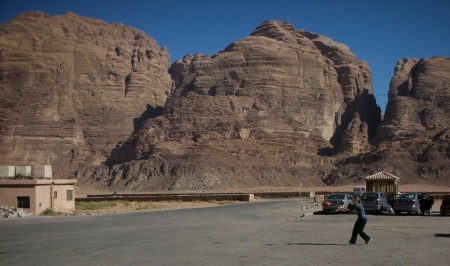
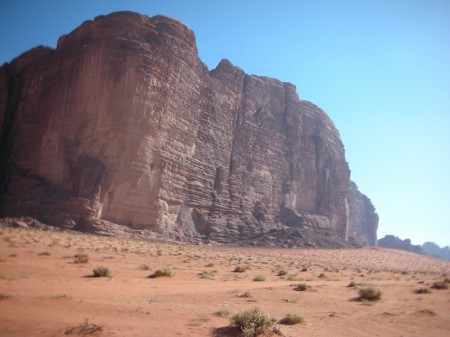
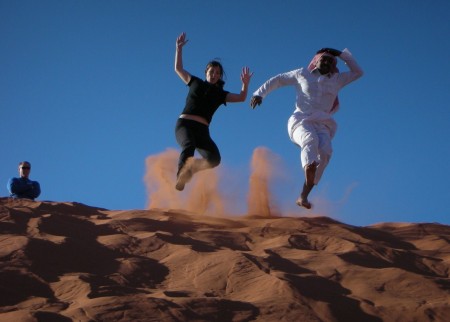
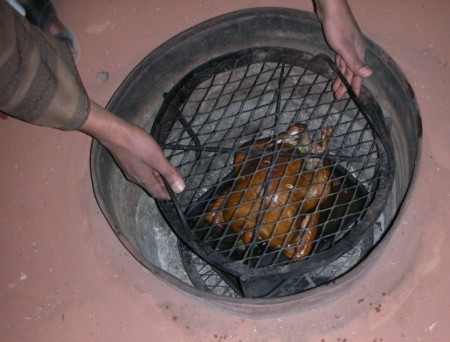
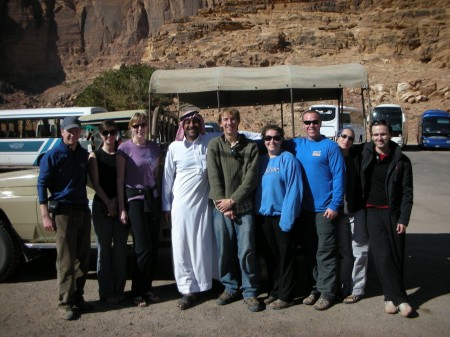


Great post, dear! Though we missed you in Brodhead, we had a good time imagining your Thanksgiving feast in Wadi Rum. That perfectly browned turkey (better than I’ll ever achieve with my Nesco) looks like it was lifted from a photo-shoot for Gourmet magazine!
I have a book on the Bedouins I had to read for Anthropology that you might find interesting. You’ll have to borrow it when I see you next.
Your meal sounded delicious, but you already know your dad is the Thanksgiving chef supreme; once again, he outdid himself, tried some new recipes, fed us like kings. We did miss you, and so did the rolls. Apparently, YOU’RE the one that can buzz us through 3 dozen. Without you, we could barely stuff down 2 dozen. And they were pretty good ones, too, so light and buttery, and perfectly browned… It’s too bad a dozen went stale…
the website is very nice
Can you please send me contact details for Suleiman and his camp?!
many thanks, Tina